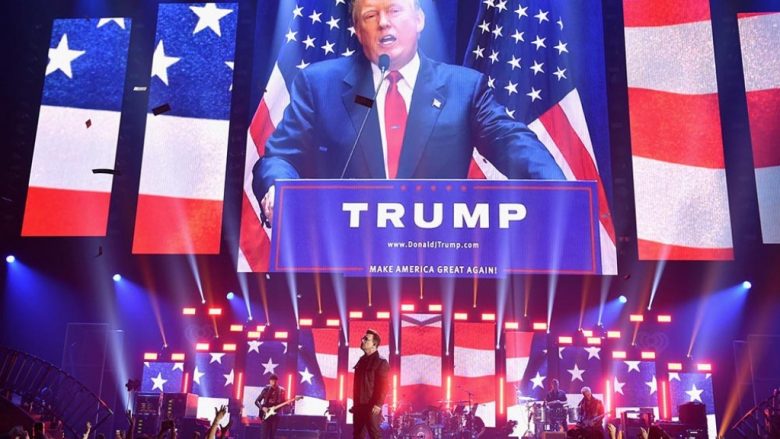Can U2 Save America from Donald Trump?
By James P. Freeman | January 18, 2017, 10:47 EST

Suit and tie comes up to me
His face red
Like a rose on a thorn bush
Like all the colours of a royal flush
And he’s peeling off those dollar bills
— “Bullet the Blue Sky,” 1987
U2’s angry, angst-driven anthem was meant to be a stinging political commentary on President Ronald Reagan’s ‘80s foreign policy, and the band’s seminal work, The Joshua Tree, was, by extension, an explorative essay about Americana, with Nevada’s desert plain serving as its cinematic lyrical leitmotif.
But today, still infatuated with America as an idea, U2 has substituted Donald Trump for Ronald Reagan, and the inspiration for the band’s newly announced tour, commemorating the 30th anniversary of the album, is really an elaborate ruse of anti-Trumpism, not a trip through the wires of celebratory nostalgia.
Fans should be prepared.
The Joshua Tree Tour 2017 (stopping in greater Boston at Gillette Stadium on June 25) seems steeped in sentimentalism — with the band even having re-created a photo based upon the iconic album cover — given the original recording’s massive popularity and youthful idealism. But guitarist The Edge, in a recent Rolling Stone interview, provides fair warning and the reasoning behind this surprise tour: “The election [happened] and suddenly the world changed … The Trump election. It’s like a pendulum has suddenly just taken a huge swing in the other direction.”
Meaning, evidently, the wrong direction.
He further explained that “things have kind of come full circle, if you want. That record was written in the mid-Eighties, during the Reagan-Thatcher era of British and U.S. politics. It was a period when there was a lot of unrest. Thatcher was in the throes of trying to put down the miners’ strike; there was all kinds of shenanigans going on in Central America. It feels like we’re right back there in a way.”
And The Edge added that while this tour is “not really about nostalgia,” the songs “have a new meaning and a new resonance today that they didn’t have three years ago, four years ago.” That was under President Barack Obama’s America of “safe-spaces” and universal health care. (The band played at a pre-inaugural concert in Washington D.C. eight years ago, heralding his election.) Trump’s America, by contrast, is now a dangerous netherworld, as U2 sees it.
Two U2 shows in 2016 offer a kinetic prelude to shows coming this spring and summer.
Last fall, before the election, performances at the iHeartRadio Music Festival and Dreamforce, in Las Vegas and San Francisco, respectively, were infused with vitriolic rants about Trump and the kind of degenerated America one should expect under his leadership.
During the song “Desire” at the iHeart show, with a video backdrop of Trump speaking, Bono asks those in attendance, “Are you ready to gamble the American Dream?” And if they were to vote for Trump they would, he admonished, lose “everything.”
At Dreamforce, during a searing version of “Bullet” — again accompanied by a Trump video — Bono, referring to border security with Mexico, said that “everyone who loves the idea of America” would have a “problem with this wall of yours.” Ironically, Bono told Charlie Rose last fall that he was “fiercely bi-partisan” and yet he thought that Trump was “trying to hijack the idea of America.”
Promoter iHeart.com, obviously oblivious, said that U2 united the crowd “with every song” at is festival. Yet social media saw it differently, according to Independent Journal Review. One fan said Bono’s excursion “was total propaganda and it ruined the night,” while another posted that “I no longer will listen to you Bono.”
Political views have always permeated U2’s music — especially in a live context. And the list of the band’s social causes over the years is long — Bono has worked directly with Congress and Presidents Bill Clinton, George W. Bush, and Obama on Third World debt relief and AIDS vaccinations. Yet it is quixotic to believe 2017 resembles 1987. (Though many Americans might wish a return to the ‘80s, after having lived through the last eight years.)
Moreover, expressing a recurring hatred for Trump during a tour marketed as a feel-good retro rehash of U2’s most celebrated album (the band intends to play the album in its entirety) could be a massive miscalculation. U2 would jeopardize its enduring popularity much the same way the Dixie Chicks did last decade with their disastrous condemnation of George W. Bush and the Iraq War in 2003.
U2 will likely tweak their contempt for Trump since he will have been president for several months when the tour opens. The question will be: how much will the band be accepted and tolerated by fans simply wanting to enjoy the music without relentless editorializing? Also, will Bono’s bombast enhance or detract from the entertainment experience?
It is odd that U2, a band not content to rely upon its past success, and always forward-thinking, would inject Donald Trump into an album thirty years old as a new-found formula for relevance. U2, it seems, have run out of new ideas. Maybe because they were wrong about Ronald Reagan’s conservative perspective all along. And maybe U2, like most progressives, do not understand the phenomenon of Trump. But using the new president as a prop to breathe new life into Joshua Tree is folly.
The album version of “Bullet the Blue Sky” ends suddenly with Bono’s stark a cappella coda: “…into the arms of America.” It will be fascinating to see if concert-goers, no doubt part of a Divided States of America, and no doubt jaded over last season’s election, will welcome Bono’s anticipated anti-Trump tirades with open arms or with a cold shoulder.
James P. Freeman is a New England-based writer and former Cape Cod Times columnist.










